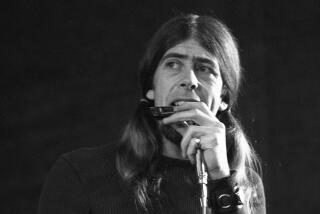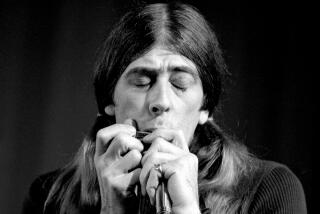R&B; Great Inspired Artists to Rise to Next Level
- Share via
Even though blues great John Lee Hooker was 83, his death Thursday was a shock to anyone who has ever fallen under the spell of his powerful and unrelenting sound.
With his often ominous, gravelly vocals and driving, single-chord guitar style, Hooker was such a commanding presence on stage and on record that you simply couldn’t imagine any force being strong enough to squeeze the life out of him. As impossible as the idea was, John Lee Hooker was supposed to be with us forever. Now, only his records will be.
Unlike many great R&B; / blues stars of the ‘40s and ‘50s whose artistry was reduced over the years to a shadow of its early glory, Hooker was someone so distinctive and vital that for more than half a century he cast a shadow over anyone who dared step on stage with him.
To the end, he intimidated other musicians, regardless of their age or reputation. He was so respected that he made other musicians sweat, fearing they wouldn’t be able to match his impeccable timing and passion.
Even so, the stars lined up to work with him--from Carlos Santana and Van Morrison to Bonnie Raitt and Pete Townshend--and they came away even more in awe.
Some early blues artists got by on attitude, but Hooker, who was born to a large family of sharecroppers in Clarksdale, Miss., also had remarkable talent.
He was a memorable singer and guitarist, but his greatest contribution to rock ‘n’ roll was the way he spoke about love and lust in raw and uncompromising terms. It was that emphasis on blues psychodramas that helped lead a generation of musicians, including the Rolling Stones, from rock adolescence to adulthood.
Hooker had R&B; hits as early as 1949, including his signature “Boogie Chillen,’ ” but he didn’t connect with young rock fans in the mid-’50s the way rivals Chuck Berry and Little Richard did because he never tailored his music to a younger crowd.
*
Rather than radio-friendly teen celebrations such as Berry’s “Sweet Little Sixteen” or Little Richard’s “Tutti-Frutti,” Hooker specialized in dark, frequently menacing tales of revenge and obsession. Teens may have thought they were sampling something a bit wild and exotic in the R&B; hits of the ‘50s, but they weren’t ready for the darkness and sexual heat that characterized the heart of Hooker’s work.
Mick Jagger and Keith Richards may have turned to Chuck Berry for some of their early, energetic rockers, but it was more the music of Hooker that helped direct them in the late ‘60s to the ominous blues foundation of more mature and threatening works such as “Midnight Rambler.”
The undercurrent of danger and violence in such early Hooker recordings as “Mad Man Blues” and “Leave My Wife Alone” was more typical of hard-edged fiction than the pop hit parade. But Hooker did reach the R&B; charts in the ‘50s and ‘60s with such signature tunes as “Crawlin’ King Snake” and “Boom Boom,” and they were potent stuff.
To Hooker, he was just a storyteller singing about love.
“When Adam and Eve first saw each other, that’s when the blues started,” he said in 1989. “No matter what anybody says, it all comes down to the same thing: a man and a woman, a broken heart, a broken home. You know what I mean.”
If it was an old theme, Hooker brought it to life with the kind of artistic vision that few have approached.
“The first time I heard him growl, my jaw hit the floor . . . all that power and emotion,” David Higaldo of Los Lobos once said.
“The man is a real [one of a kind],” added Van Morrison. “He is a window into another age.”
Because he wasn’t a teen hero in the ‘50s, Hooker wasn’t elected to the Rock and Roll Hall of Fame until well after such contemporaries as Berry, Little Richard and Bo Diddley.
But if the voting had been limited to Hall of Fame members themselves--rather than a group of critics, record executives and musicians--Hooker would have been elected when he was first eligible in 1985. With his death, a piece of pop history is gone.
More to Read
The biggest entertainment stories
Get our big stories about Hollywood, film, television, music, arts, culture and more right in your inbox as soon as they publish.
You may occasionally receive promotional content from the Los Angeles Times.










